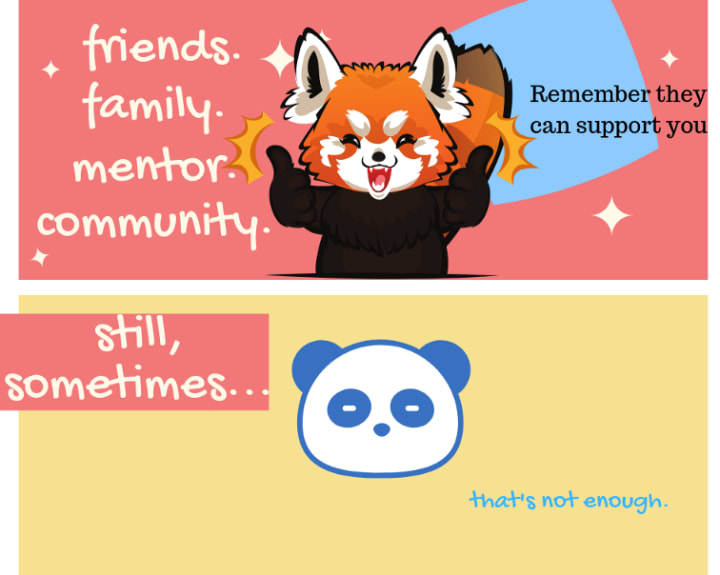
When you’ve lived in fear a good chunk of your life, things like coronavirus don’t seem all that terrifying. This is the world of the chronically and mentally ill. Welcome, everybody else.
The world of worrying over sick family members, being in quarantine is not new to millions of people across the United States. People living with painful conditions such as lupus, HIV, fibromyalgia, MS, Lou Gehrig’s, I could go on, these people live with fear every day. Worst part is, a lot of us carry our worries privately. We keep it to ourselves to ensure that people are more comfortable around us. We smile as our insides churn, we grade papers, bag groceries, go to the bank, attend classes all while worrying about whether or not we might live through the year, whether we can afford to.
Before the coronavirus hit, I was worried about my health benefits being taken from me. I still am. I am a 31-year-old lupus survivor. I’ve been hospitalized almost a dozen times over the course of five years, almost died four or five times, been reverse-quarantined (I had to be protected from everyone else), been on experimental treatments, I’ve survived it all. I’ve been in the room with twenty some odd doctors telling me they don’t know what’s wrong or worse still, they know what’s wrong but that I can’t afford the treatment. I've cried myself to sleep wondering if the government will have enough empathy to consider helping with my survival. I’ve done this and so have millions of other Americans.
Right now people are grabbing up tissues, toilet paper, fighting their fellow neighbors for basic household items. I’ve had to watch the elderly fight for their right to use insulin for years. I’ve watched mothers whose adult children with Down Syndrome be denied their medication on an insurance company’s whim. I have been a patient, spent eight years as a pharmacy technician and was also a life insurance agent. I walked away because I got tired of telling the sick, the elderly, the dying that they would have to go without their medicine and go home. That feeling a lot of normal people have now, where they’re afraid to go to work because of catching an illness, that has been me. I would explain my need for a sterile environment with specific accommodations to my employer and hear the audible scoff over the phone as if I wanted to be difficult intentionally.
Imagine laughing at someone about that now in this climate.
With my lupus, one has to avoid sunlight, stay away from the sick, eat certain foods, exercise, avoid stress and in my case use natural oils and steroid creams to avoid skin damage. I say my lupus because all lupus patients have different exhibited symptoms, all of us have to have our needs tailor met because it can attack any organ in our body without warning. Our skin, our blood, our heart, our brain, deciding one day it doesn’t want to work. I carry that but so do the people closest to me. Financially, striking out on my own, has been roadblock after roadblock because my care supersedes my progress. When it comes to school, work, even marriage, being disabled is a severe drawback. Monetarily, it takes longer to complete school, if we do at all. Less than 42% of disabled Americans are able to complete a two-year college program and even less than that are capable of completing a four-year college within eight years. This is an incredibly sad percentage because it has also been recorded that 90% of colleges have reported accepting students with disabilities since 2011. "Disabled students may have dorm rooms that are accessible, but they can’t visit any other student on campus, or students in need of interpreters or notetakers might receive one of poor quality, or a building might have just one accessible bathroom or only one elevator. ..In all these cases, the campus is meeting the accommodation request and is in compliance, but they really aren’t following the spirit of the law or helping students with disabilities feel welcome"(Ali, 2020). This is why when interpreting laws such as the Individuals with Disabilities Education Act (IDEA), they may seem effective but still manage to leave so many people with special needs or disabilities without the resources that they need. Assuming that students' needs won't vary or will not change over time is unrealistic. It should also be noted that in some cases another downfall of education for the disabled is that they are taught the knowledge to be successful but not the physical or social means to be. An able-bodied person can be provided tutors, have access to extensive training from college to career. They also don't have laws that directly hinder their success. This is a massive difference in treatment and removes the possibility of inclusivity in some of the places that it matters most.
For a person with disabilities, everything is taught to them but how to manage their disability in the work environment and the real world. According to a first-person account within the Hechinger Report, "Salomon believed the tasks he was given reflected the low expectations the school had for her son and others like him: tasks like putting pizza boxes together and cleaning the locker room at the local YMCA. ..said that Adam learned some soft skills, like managing a schedule, but only because he had a job at a grocery store after school. She thinks her son would have been more prepared to interact with co-workers and organize his time if he’d had more opportunities to interact with non-disabled peers and had practiced soft skills “in real-time,” so that behavior could be corrected and practiced in real situations."(Mader & Butrymowicz, 2017). My situation is slightly different. When it comes to work, in order to maintain full Supplemental Security Income (SSI)and Social Security Disability Insurance (SSDI) health coverage from the government in my state, I must make less than 1,300$ a month. Because I am not considered mentally ill, if I were to become married, my husband’s income would alter my insurance or worse leave me with none at all. This severely limits my job options. My skills prior to becoming fully disabled should allow me to earn a high base-paying salary. However, I have to turn offers down, whether the position can accommodate my needs or not. Every point of advancement in life is completely committed to my disease, though I try hard for it not to be. People I love, like my grandmother, have had to die miles apart from family because we couldn’t afford the time away to be there. Cancer is a debilitating disease both physically and financially. To fight cancer funds are necessary, any disease needs a solid support system. America needs to be a country more centered on support. We need to learn empathy, rather than the age-old pull yourself up mentality.

Why are some of us not afraid now? Why are some of us not afraid to lend a helping hand?
This pandemic doesn’t scare us, sick folks, because, for the longest time, the lack of empathy from normal people was the pandemic. We lived in fear of you all every day. Every decision made about healthcare on our behalf, every denial of Medicare for All, every rejection for prolonged sick leave, for accommodations for the disabled, we were told we had to be limited because “we had to think of everyone else". Now here we are, everyone else is finally suffering enough for healthcare to be a consideration for all. The government is still lagging, pretending they’re immortal but eventually, if enough people get sick they’ll do something. Is it not sad that that’s what we have to wait for? That’s what burns up so many chronically ill people like myself, the fact that we had to wait longer than anyone else. We’ve gone bankrupt, lost houses, lost loved ones, lost limbs, lost so many, many opportunities to be happy, because “ we had to think of everyone else", and even now I’m sure that’s what a lot of us are doing, casting aside our own aspersions to help the abled out. Fellow friends with illnesses, with their own life draining issues are putting their needs aside to help the less medically savvy. They are stepping up to the front lines and giving advice, donating supplies, organizing drives and sharing videos of how to stay safe. We still have to worry about our diseases, we still walk with a limp, still have to have worry about our skin falling off, our lower intestine malfunctioning, having a seizure in a public place but at the same time we’re here for you because we get it. We know what it’s like to be without resources and feel completely alone. We know what it’s like to be abandoned by the system, told no when the only answer that makes sense is yes.

Healthcare has always been a battle, for me and so many others staying alive has always been a struggle but we’ve done it every day this far, without much consideration from abled people. Now that you see the glaring holes that we’ve been pointing at for decades, remember where they were. Help us fill these holes. No more making us choose between insulin and college, lupus and having a home. Same as the abled deserve to be treated with dignity, so do we. This is a world where movie theaters can give access to the deaf and hard of hearing. This is a world where the sick can live and die in comfort. This is a world where we can listen to patients regardless of gender, orientation, religion or race. This is a world where we are capable of these things but have waited until now to do them. Ask yourself why. Ask yourself how many people have died from things we can cure or treat like diabetes. Ask how many people die without healthcare in this country. When this is over, ask the right questions of your government because if you don’t they’ll say the same thing to you that they’ve been saying to people like me for years, “we had to think of everyone else.”
References
Ali, S. S. (2020, March 1). 30 years after Americans with Disabilities Act, college students with disabilities say law is not enough. NBC News. Retrieved November 24, 2020, from https://www.nbcnews.com/news/us-news/30-years-after-americans-disability-act-college-students-disabilities-say-n1138336
Lee, A. (2020, November 17). The 13 disability categories under IDEA. Retrieved November 24, 2020, from https://www.understood.org/en/school-learning/special-services/special-education-basics/conditions-covered-under-idea
Mader, J., & Butrymowicz, S. (2017, November 11). The vast majority of students with disabilities don’t get a college degree. The Hechinger Report. Retrieved November 24, 2020, from https://hechingerreport.org/vast-majority-students-disabilities-dont-get-college-degree/
About the Creator
L Sophystra
Writer, singer, painter, dancer and spoken word artist. Come into the world of the Lady. Diversify what you know, living with lupus since age 12, this unique artist offers perspective that will change your heart and mind.






Comments
There are no comments for this story
Be the first to respond and start the conversation.